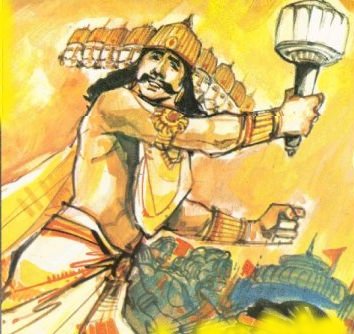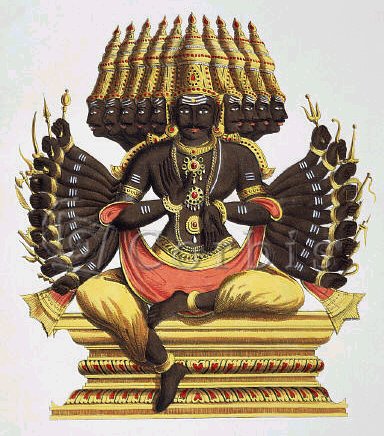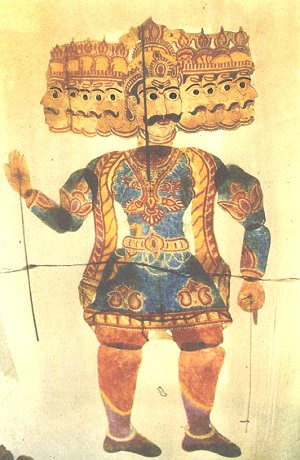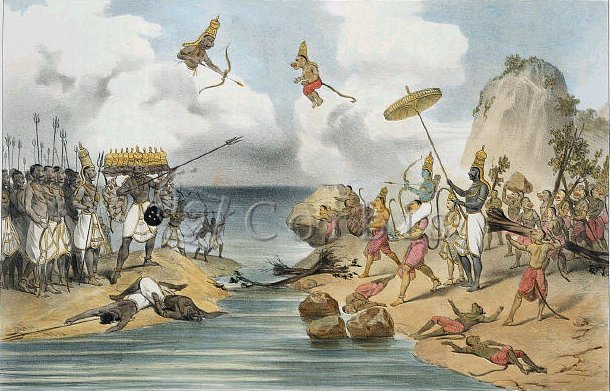RAVANA
<< Back to Dasara resource
SEND - Sai Baba theme Dussera -
Navaratri - Vijaya Dashami Greeting e card:
 In the Age of the Ramayana Epic,
Ravana was the most powerful Tamil King of Lankapuri (Ceylon or Sri Lanka). He
was a renowned devotee of Siva, who was pleased with his severe penances and
austerities, granted him the boons of earthly fame and worldly might. Ravana was
a very talented Veena (Indian music instrument) player. Ravana used Veena
picture on the country flag. Ravana is not a Hindu God but rather a demon given
great powers by the Gods because of his worship. The Gods granted him immunity
from Death by a God and conferred super-powers upon him. Ravana set himself up
as Tamil King of Lankapuri (Ceylon or Sri Lanka).
In the Age of the Ramayana Epic,
Ravana was the most powerful Tamil King of Lankapuri (Ceylon or Sri Lanka). He
was a renowned devotee of Siva, who was pleased with his severe penances and
austerities, granted him the boons of earthly fame and worldly might. Ravana was
a very talented Veena (Indian music instrument) player. Ravana used Veena
picture on the country flag. Ravana is not a Hindu God but rather a demon given
great powers by the Gods because of his worship. The Gods granted him immunity
from Death by a God and conferred super-powers upon him. Ravana set himself up
as Tamil King of Lankapuri (Ceylon or Sri Lanka).
In the height of his sovereignity,
imbued with the desire to have the Lord of Kailas, his tutelary Diety installed
in Lanka, he exceeded the limits of disciplined discrimination, and
attempted by his invincible strength to transfix Mount Kailas, the traditonal
abode of Siva from the Himalayan region to that of Lanka. He was foiled in this
feat by the Lord crushing him under His Feet; and finally it was his astonding
act of penance that saved him from the wrath of Siva. Ravana ripped into his
left thigh, removed the nerve fibres and turned it into a lyre, and sang praise
of Siva. Then it was that Siva released him, pleased with his mortification.
This episode of Ravana was constantly alluded by the Saiva psalmists to signify
that piety and devotion alone without purity and humility, could not redeem man
or give him peace. Ravana was a great Hindu Bhakta; yet his code of life
violated the Hindu Dharma and he had to pay for it dearly.
Lanka, he exceeded the limits of disciplined discrimination, and
attempted by his invincible strength to transfix Mount Kailas, the traditonal
abode of Siva from the Himalayan region to that of Lanka. He was foiled in this
feat by the Lord crushing him under His Feet; and finally it was his astonding
act of penance that saved him from the wrath of Siva. Ravana ripped into his
left thigh, removed the nerve fibres and turned it into a lyre, and sang praise
of Siva. Then it was that Siva released him, pleased with his mortification.
This episode of Ravana was constantly alluded by the Saiva psalmists to signify
that piety and devotion alone without purity and humility, could not redeem man
or give him peace. Ravana was a great Hindu Bhakta; yet his code of life
violated the Hindu Dharma and he had to pay for it dearly.
 Again in the life of Ravana,
his insatiable pride and lust made him carry off Sita, the chaste wife of Rama
of the powerful dynasty of Raghu at Ayodhya, when they were living in the forest
in exile. Rama and his union with the monkey God Hanuman to eventually attack
Lankapuri ( Ceylon or Sri Lanka) and kill Ravana. Ravana was able by magic art
to take his soul out of his body and leave it in a box at home, while he went to
the wars. Thus he was invulnerable in battle. When he was about to give battle
to Rama, he deposited his soul with a hermit called Fire-eye, who was to keep it
safe for him. So in the fight Rama was astounded to see that his arrows struck
the king without wounding him. But one of Rama’s allies, knowing the secret of
the king’s invulnerability, transformed himself by magic into the likeness of
the king, and going to the hermit asked back his soul. On receiving it he soared
up into the air and flew to Rama, brandishing the box and squeezing it so hard
that all the breath left the King of Lankapuri's ( Ceylon or Sri Lanka) body,
and he died. You will get much pleasure from reading the Ramayana and tracking
the whole adventure.
Again in the life of Ravana,
his insatiable pride and lust made him carry off Sita, the chaste wife of Rama
of the powerful dynasty of Raghu at Ayodhya, when they were living in the forest
in exile. Rama and his union with the monkey God Hanuman to eventually attack
Lankapuri ( Ceylon or Sri Lanka) and kill Ravana. Ravana was able by magic art
to take his soul out of his body and leave it in a box at home, while he went to
the wars. Thus he was invulnerable in battle. When he was about to give battle
to Rama, he deposited his soul with a hermit called Fire-eye, who was to keep it
safe for him. So in the fight Rama was astounded to see that his arrows struck
the king without wounding him. But one of Rama’s allies, knowing the secret of
the king’s invulnerability, transformed himself by magic into the likeness of
the king, and going to the hermit asked back his soul. On receiving it he soared
up into the air and flew to Rama, brandishing the box and squeezing it so hard
that all the breath left the King of Lankapuri's ( Ceylon or Sri Lanka) body,
and he died. You will get much pleasure from reading the Ramayana and tracking
the whole adventure.

There are lot of evidence proofs that
powerful Tamil King of Lankapuri (Ceylon or Sri Lanka) Ravana has been lived in
Trincomalee. Because the Tamil tradition has it that the wife of the mythical
king of Lankapuri, Ravana who was a devotee of Siva, worshipped at the
Koneswaram shrine in Trincomalee. Another proof is Discovery of Ravana's
swayambhu lingam. It was originally found on a Tibetan mountain and later
brought to Sri Lanka reportedly by the Tamil King Ravana. Moreover, in the Ramayana Epic period
Ravana has used Veena as Ceylon Flag and according to the "Veena" Pictures on
the Trincomalee Fort proofs that Ravana has dominated in Trincomalee. Also the
seven Hot Wells ( Hot springs ) in Kanniya was made by the Tamil king Ravana.
Online source: TrincoOnline History
(http://chat.carleton.ca/~jshanthi/trincoonline/ravana.html)
 In the Age of the Ramayana Epic,
Ravana was the most powerful Tamil King of Lankapuri (Ceylon or Sri Lanka). He
was a renowned devotee of Siva, who was pleased with his severe penances and
austerities, granted him the boons of earthly fame and worldly might. Ravana was
a very talented Veena (Indian music instrument) player. Ravana used Veena
picture on the country flag. Ravana is not a Hindu God but rather a demon given
great powers by the Gods because of his worship. The Gods granted him immunity
from Death by a God and conferred super-powers upon him. Ravana set himself up
as Tamil King of Lankapuri (Ceylon or Sri Lanka).
In the Age of the Ramayana Epic,
Ravana was the most powerful Tamil King of Lankapuri (Ceylon or Sri Lanka). He
was a renowned devotee of Siva, who was pleased with his severe penances and
austerities, granted him the boons of earthly fame and worldly might. Ravana was
a very talented Veena (Indian music instrument) player. Ravana used Veena
picture on the country flag. Ravana is not a Hindu God but rather a demon given
great powers by the Gods because of his worship. The Gods granted him immunity
from Death by a God and conferred super-powers upon him. Ravana set himself up
as Tamil King of Lankapuri (Ceylon or Sri Lanka).  Lanka, he exceeded the limits of disciplined discrimination, and
attempted by his invincible strength to transfix Mount Kailas, the traditonal
abode of Siva from the Himalayan region to that of Lanka. He was foiled in this
feat by the Lord crushing him under His Feet; and finally it was his astonding
act of penance that saved him from the wrath of Siva. Ravana ripped into his
left thigh, removed the nerve fibres and turned it into a lyre, and sang praise
of Siva. Then it was that Siva released him, pleased with his mortification.
This episode of Ravana was constantly alluded by the Saiva psalmists to signify
that piety and devotion alone without purity and humility, could not redeem man
or give him peace. Ravana was a great Hindu Bhakta; yet his code of life
violated the Hindu Dharma and he had to pay for it dearly.
Lanka, he exceeded the limits of disciplined discrimination, and
attempted by his invincible strength to transfix Mount Kailas, the traditonal
abode of Siva from the Himalayan region to that of Lanka. He was foiled in this
feat by the Lord crushing him under His Feet; and finally it was his astonding
act of penance that saved him from the wrath of Siva. Ravana ripped into his
left thigh, removed the nerve fibres and turned it into a lyre, and sang praise
of Siva. Then it was that Siva released him, pleased with his mortification.
This episode of Ravana was constantly alluded by the Saiva psalmists to signify
that piety and devotion alone without purity and humility, could not redeem man
or give him peace. Ravana was a great Hindu Bhakta; yet his code of life
violated the Hindu Dharma and he had to pay for it dearly.  Again in the life of Ravana,
his insatiable pride and lust made him carry off Sita, the chaste wife of Rama
of the powerful dynasty of Raghu at Ayodhya, when they were living in the forest
in exile. Rama and his union with the monkey God Hanuman to eventually attack
Lankapuri ( Ceylon or Sri Lanka) and kill Ravana. Ravana was able by magic art
to take his soul out of his body and leave it in a box at home, while he went to
the wars. Thus he was invulnerable in battle. When he was about to give battle
to Rama, he deposited his soul with a hermit called Fire-eye, who was to keep it
safe for him. So in the fight Rama was astounded to see that his arrows struck
the king without wounding him. But one of Rama’s allies, knowing the secret of
the king’s invulnerability, transformed himself by magic into the likeness of
the king, and going to the hermit asked back his soul. On receiving it he soared
up into the air and flew to Rama, brandishing the box and squeezing it so hard
that all the breath left the King of Lankapuri's ( Ceylon or Sri Lanka) body,
and he died. You will get much pleasure from reading the Ramayana and tracking
the whole adventure.
Again in the life of Ravana,
his insatiable pride and lust made him carry off Sita, the chaste wife of Rama
of the powerful dynasty of Raghu at Ayodhya, when they were living in the forest
in exile. Rama and his union with the monkey God Hanuman to eventually attack
Lankapuri ( Ceylon or Sri Lanka) and kill Ravana. Ravana was able by magic art
to take his soul out of his body and leave it in a box at home, while he went to
the wars. Thus he was invulnerable in battle. When he was about to give battle
to Rama, he deposited his soul with a hermit called Fire-eye, who was to keep it
safe for him. So in the fight Rama was astounded to see that his arrows struck
the king without wounding him. But one of Rama’s allies, knowing the secret of
the king’s invulnerability, transformed himself by magic into the likeness of
the king, and going to the hermit asked back his soul. On receiving it he soared
up into the air and flew to Rama, brandishing the box and squeezing it so hard
that all the breath left the King of Lankapuri's ( Ceylon or Sri Lanka) body,
and he died. You will get much pleasure from reading the Ramayana and tracking
the whole adventure. 